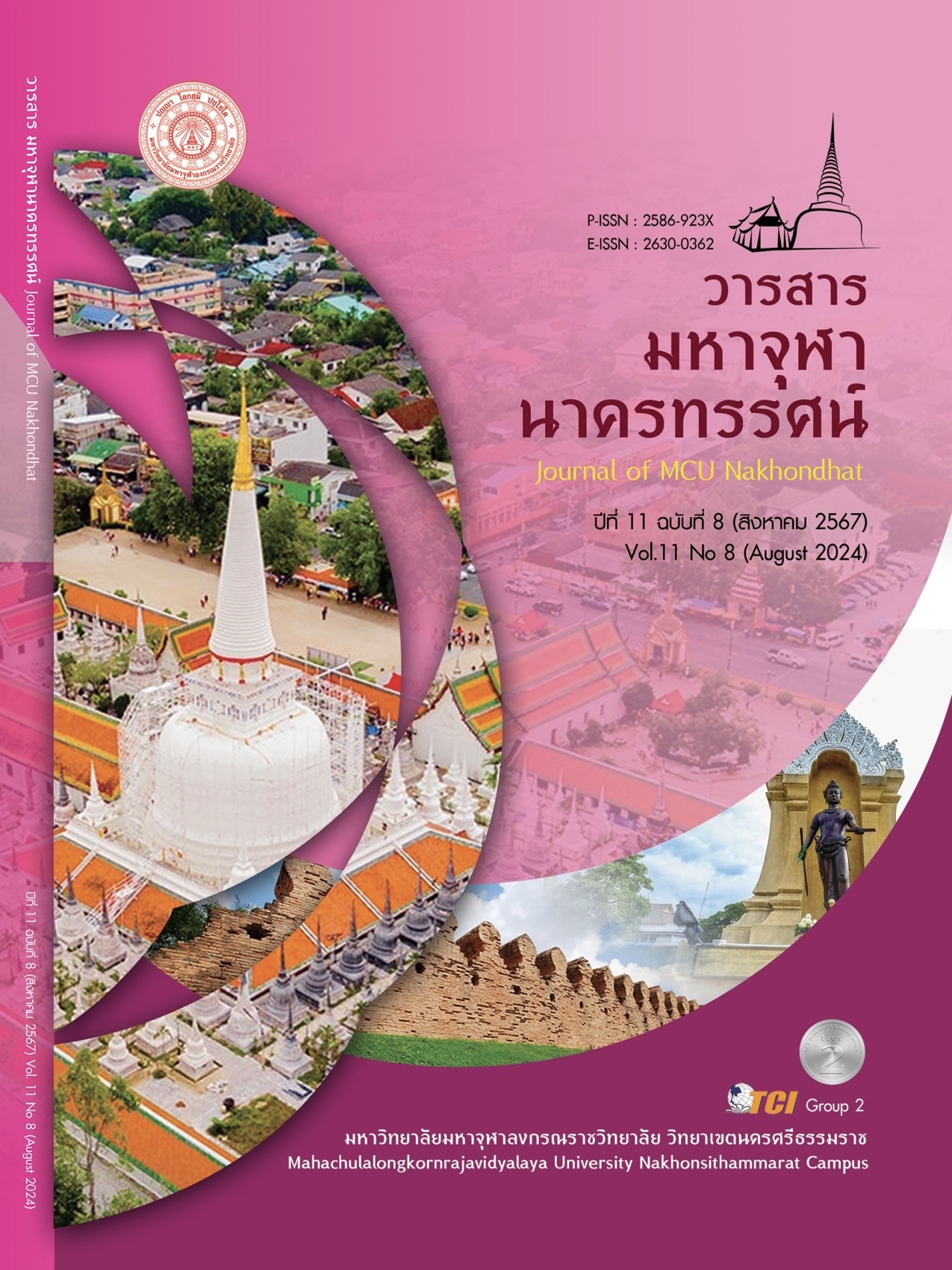GUIDELINES FOR DEVELOPING THE PARTICIPATION OF SCHOOL BOARDS AND SCHOOL ADMINISTRATIONS IN THE NEXT NORMAL IN THE EDUCATION SANDBOX OF TRAT PROVINCE
Main Article Content
Abstract
The purposes of this research are to 1) Study the development of participation of school boards in the new normal administration, 2) Study the level of development of participation of school board members in the new normal in the new normal administration, and 3) Present guidelines for developing the participation of school boards in the new normal administration; Education Sandbox, Trat Province. It is a combined method research. The quantitative tool is a questionnaire. The sample size was 260 people. Proportional Stratified Random Sampling was used, using the size of the educational institution as the sampling stratum. Data were analyzed by means, standard deviations, t-tests, and one-way analysis of variance. Qualitative research tools are structured questionnaires. There were 12 key informants. They were selected purposively with criteria of being school administrators, teachers with 5 years of experience, and willing to provide information. Content analysis and examined using triangulation techniques. The results showed that participatory development consisted of analysis of potential capital, formulation of innovation as needed, innovation development, determination of the effectiveness of educational innovation, contextual experimentation, evaluation, and amplification, The comparative results on participation development. They are classified by district as a whole and by side to a large extent. In descending order are personnel management, general administration, academic administration, and budget management. There was a statistically significant difference at the level. 0.5. And Approaches to engagement development include creating engagement spaces, holistic support, policies and strategic plans, developing professional skills, and creating transparency.
Article Details

This work is licensed under a Creative Commons Attribution-NonCommercial-NoDerivatives 4.0 International License.
References
กฎกระทรวงกำหนดหลักเกณฑ์และวิธีการกระจายอำนาจการบริหารและการจัดการศึกษา พุทธศักราช 2550. (2550). ราชกิจจานุเบกษา. 16 พฤษภาคม 2550 เล่ม 124 ตอนที่ 24 ก: หน้า 29-36.
กมล อยู่สุข และคณะ. (2557). รูปแบบการบริหารแบบมีส่วนร่วมของคณะกรรมการสถานศึกษาขั้นพื้นฐานขนาดเล็ก. วารสารบัณฑิตศึกษา มหาวิทยาลัยราชภัฏวไลยอลงกรณ์ ในพระบรมราชูปภัมถ์, 8(3), 152-166.
ไชยยุทธ์ อินบัว และสืบพงศ์ สุขสม. (2565). การนำนโยบายพื้นที่นวัตกรรมทางการศึกษาไปปฏิบัติ ในเขตพื้นที่การศึกษาจังหวัดปัตตานี. วารสาร มจร พุทธปริทรรศน์, 7(4), 30-41.
ดรัลรัตน์ ฮามพิทักษ์. (2562). แนวทางการมีส่วนร่วมของคณะกรรมการสถานศึกษาขั้นพื้นฐานในการบริหารและการจัดการศึกษา ของโรงเรียนสังกัดสำนักงานเขตพื้นที่การศึกษามัธยมศึกษา เขต 19. วารสารบัณฑิตศึกษา มหาวิทยาลัยราชภัฏสกลนคร, 16(74), 118-130.
ตัวแทนคณะกรรมการสถานศึกษา คนที่ 1. (9 กุมภาพันธ์ 2567). แนวทางการพัฒนาการมีส่วนร่วมของคณะกรรมการสถานศึกษาในการบริหารวิถีใหม่พื้นที่นวัตกรรมการศึกษา จังหวัดตราด. (กิติพันธ์ บัวเขียว, ผู้สัมภาษณ์)
ตัวแทนคณะกรรมการสถานศึกษา คนที่ 2. (9 กุมภาพันธ์ 2567). แนวทางการพัฒนาการมีส่วนร่วมของคณะกรรมการสถานศึกษาในการบริหารวิถีใหม่พื้นที่นวัตกรรมการศึกษา จังหวัดตราด. (กิติพันธ์ บัวเขียว, ผู้สัมภาษณ์)
ตัวแทนคณะกรรมการสถานศึกษา คนที่ 3. (20 กุมภาพันธ์ 2567). แนวทางการพัฒนาการมีส่วนร่วมของคณะกรรมการสถานศึกษาในการบริหารวิถีใหม่พื้นที่นวัตกรรมการศึกษา จังหวัดตราด. (กิติพันธ์ บัวเขียว, ผู้สัมภาษณ์)
ตัวแทนคณะกรรมการสถานศึกษา คนที่ 4. (20 กุมภาพันธ์ 2567). แนวทางการพัฒนาการมีส่วนร่วมของคณะกรรมการสถานศึกษาในการบริหารวิถีใหม่พื้นที่นวัตกรรมการศึกษา จังหวัดตราด. (กิติพันธ์ บัวเขียว, ผู้สัมภาษณ์)
บัณฑิตย์ ลิมปนชัยพรกุล และธนีนาฏ ณ สุนทร. (2559). องค์ประกอบและตัวบ่งชี้การบริหารแบบมีส่วนร่วมของคณะกรรมการสถานศึกษาขั้นพื้นฐาน. วารสารสันติศึกษา ปริทรรศน์ มจร, 9(1), 177-189.
พระครูกิตติญาณวิสิฐ (ธนา หอมหวน) และคณะ. (2565). แนวทางการพัฒนาพื้นที่นวัตกรรมทางการศึกษา. วารสารศิลปการจัดการ, 6(2), 747-763.
พระราชบัญญัติ พื้นที่นวัตกรรมการศึกษา พ.ศ. 2562. (2562). ราชกิจจานุเบกษา. 30 เมษายน 2562 เล่ม 136. ตอนที่ 56 ก: หน้า 102-120.
วราภรณ์ พุทธวงษ์ และคณะ. (2560). แนวคิดการบริหารสถานศึกษา. วารสารวิชาการมหาวิทยาลัยอีสเทิร์นเอเชีย ฉบับสังคมศาสตร์และมนุษยศาสตร์, 7(1), 16-23.
วสันต์ เหลือประภัสส์. (2566). ถอดสูตรกระจายอำนาจจัดการศึกษา พัฒนาโดยยึดเด็กเป็นศูนย์กลาง ให้อำนาจตัดสินใจอยู่พื้นที่. เรียกใช้เมื่อ 28 เมษายน 2567 จาก https://www.eef.or.th/article-071223/
ศิรินาถ แสนบุ่งค้อ และคณะ. (2559). การมีส่วนร่วมในการบริหารของคณะกรรมการสถานศึกษาขั้นพื้นฐานในโรงเรียนสังกัดสำนักงานเขตพื้นที่การศึกษาประถมศึกษาเลย เขต 2. วารสารราชพฤกษ์, 14(2), 114-121.
สำนักงานศึกษาธิการจังหวัดตราด. (2566). แผนพัฒนาการศึกษาการศึกษาจังหวัดตราด ประจำปีงบประมาณ พ.ศ. 2566-2570 (ฉบับทบทวน ประจำปีงบประมาณ พ.ศ. 2566). ตราด: กลุ่มนโยบายและแผน.
Cronbach, L. J. (1990). Essentials of Psychological Testing. (5th ed.). New York: Harper Collins.
Krejcie, R. V. & Morgan, D. W. (1970). “Determining Sample Size for Research Activities,”. Educational and Psychological Measurement, 30(3), 607-610.
Likert, R. (1993). A Technique for the Measurement of Attitude. Chicago: Rand Mc Nally.


